This past August, on my tour visiting grokkists across Europe, I found myself in London with a ticket to Hadestown.
I knew nothing more than that it was a retelling of the Orpheus and Eurydice myth; in fact, my friend, well versed in classics, whispered the outline to me in our seats before the curtain rose.
Orpheus, the greatest musician, falls in love with Eurydice. She dies, and he descends into the underworld to bring her back. By the power of his song he moves even Hades to pity, and the god agrees to release her—with a couple of important conditions. Eurydice must walk behind Orpheus on the long road back to the surface, and he must not look back to see her until they both have crossed into the upper world. They climb together, one following the other through the shadows. He almost makes it. Almost. But at the very threshold, Orpheus turns. In that instant she vanishes forever.
That’s the version I heard in the theatre before the lights dimmed. What creator Anaïs Mitchell gives us is both recognisably that story and also something else, something strikingly modern.
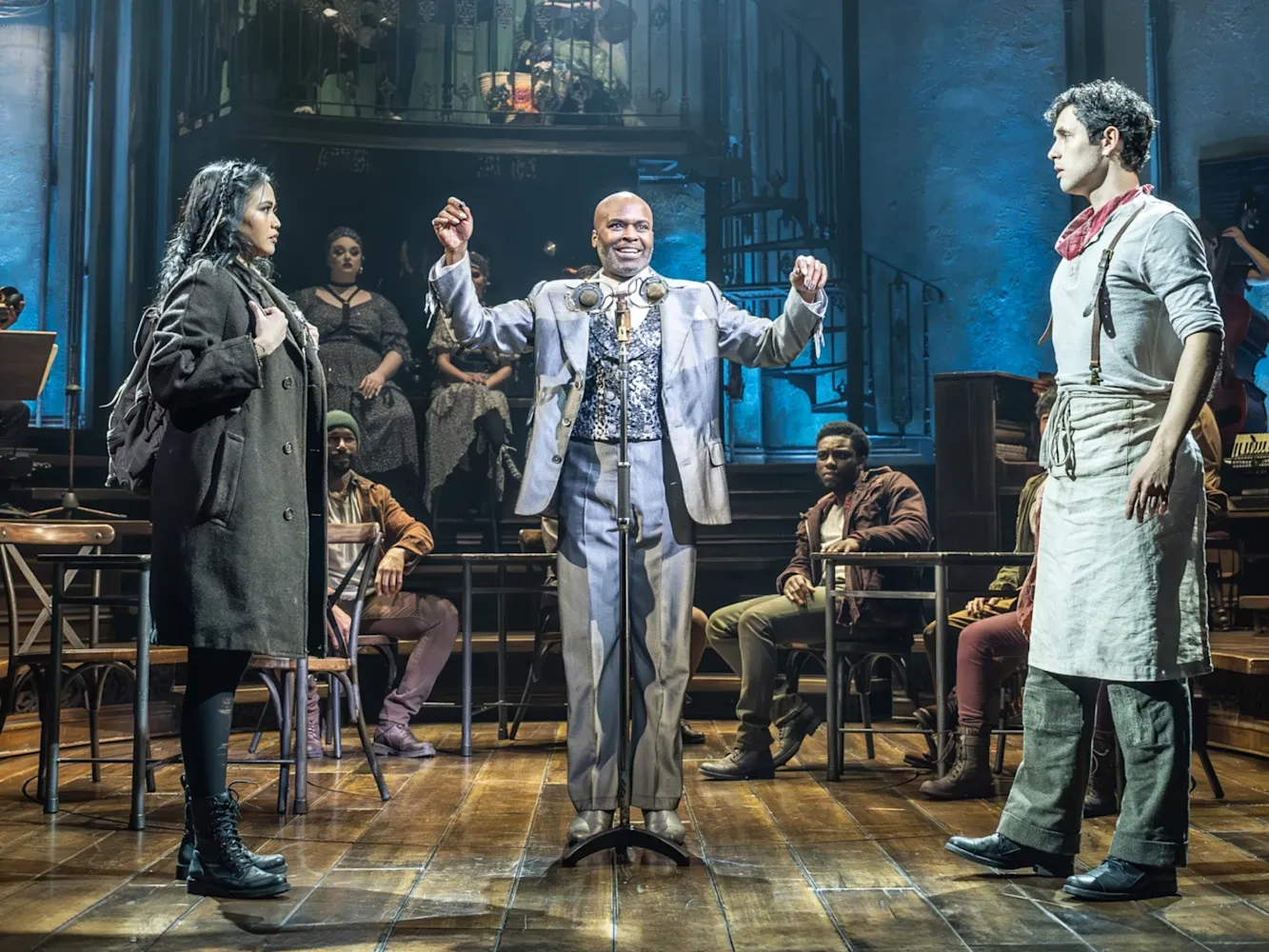
The musical begins with Hermes telling us:
“It’s a sad song, but we’re gonna sing it anyway.”
In that single line, the whole enterprise declares itself: the point is not whether we know the ending. We always know the ending. The point is to sing it anyway.
When singer-songwriter Anaïs Mitchell first conceived Hadestown as a community theatre project, she played it in community halls around Vermont with friends. A 'folk opera' concept album followed in 2010, featuring Justin Vernon of Bon Iver and Ani DiFranco, before years of collaboration with director Rachel Chavkin shaped it into the award-winning Broadway and West End musical we know today.
That lineage matters: the show is steeped in folk DNA, the song passed hand to hand, reshaped each time it’s sung. In this it echoes the Orpheus myth itself, which was never a single fixed text but a living oral tradition, refracted through countless voices. By the time Virgil touched it in the Georgics and Ovid in the Metamorphoses, they too were already retelling a story that had been sung many times before.
We always know the ending. The point is to sing it anyway.
Mitchell’s musical inherits that folk ethos but transposes it into a Depression-era world—part speakeasy, part chain gang, part underworld factory floor.

Workers in caps and suspenders form the chorus, the band sits on stage, and the underworld itself is imagined as a humming industrial complex of machines, oppressive walls, and men and women bent double at the rhythm of labour.
It is a world of grinding inevitabilities: poverty, hunger, climate precarity, the cold machinery of extractive systems. Here the underworld is not simply the realm of the dead but the dehumanising logic of the factory line and the border wall, the endless machine that devours human effort and spits out despair. Hades is not a fiery demon but an industrialist, a border-builder, the voice of efficiency and order.
Orpheus and Eurydice in a Broken World
But before Hades darkens the stage, Hadestown first invites us to sit with Orpheus. He is introduced as a poor boy bussing tables, naïve and dreamy, with little to his name beyond the thing no system can strip from him: his song.
Orpheus was a poor boy,
But he had a gift to give.
He could make you see how the world could be:
In spite of the way that it is.
This is the essence of his power. What he carries is vision, sung into being. His music can “take what’s broken, make it whole… bring the world back into tune, back into time, until all the flowers bloom.”
The framing matters. In the ancient versions, Orpheus is the greatest musician simply because the gods decreed it, his music innately irresistible. Mitchell’s version shifts the emphasis. Hermes, our narrator, tells us he knew Orpheus’s mother—“His mama was a friend of mine”—and that after she was gone, he took the boy under his wing. Orpheus isn’t destined from birth to greatness; he is the child of someone cared for, passed along, raised in relationship. His gift blooms in that fragile soil of nurture and loss.
Here, Orpheus’s song is not a matter of divine power but of imagination—the fragile gift of showing how the world could be otherwise. His music is an act of resonance, restoring sound where despair has hollowed it out.
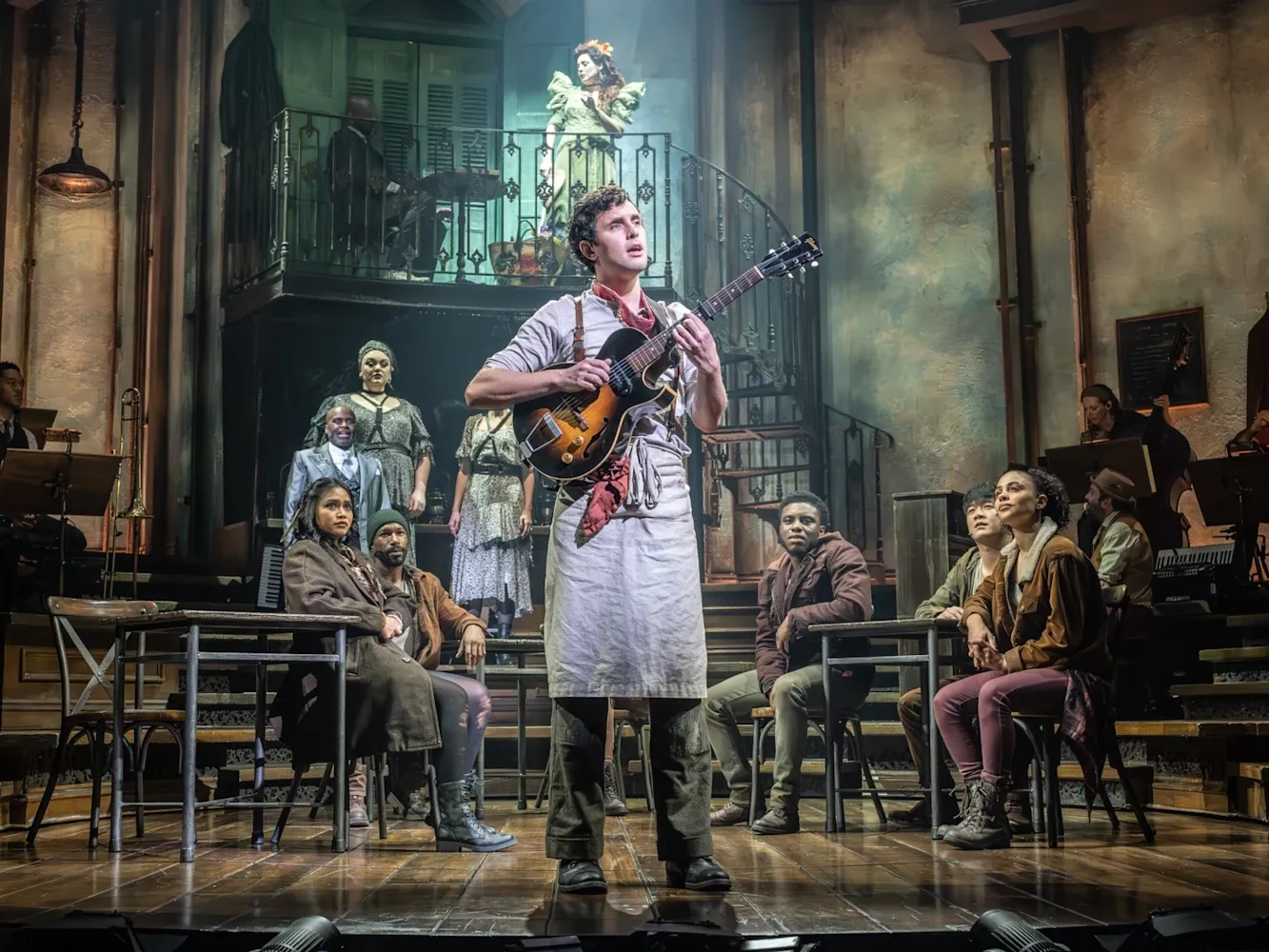
Orpheus’s song is not a matter of divine power but of imagination—the fragile gift of showing how the world could be otherwise.
If Orpheus is all dream and song, Eurydice enters from another register. She arrives cold and hungry, wary of promises beauty can’t keep.
Her first song, All I’ve Ever Known, is a declaration of longing mixed with fear. She sings of wanting to step outside the small circle of survival that has defined her life, to trust in the possibility of love, but also of the cost of opening herself to that risk. “All I’ve ever known is how to hold my own,” she says, before daring to ask what it might mean to walk beside someone else—longing for love but haunted by the cost of survival.
The Fates drive the point home in When the Chips Are Down, their taunt that when hunger bites, “ain’t nobody but yourself to trust.”
Later, Hades sharpens the same logic in Songbird:
Hey, little songbird, let me guess:
He’s some kind of poet and he’s penniless?
Give him your hand, he’ll give you his hand-to-mouth.
He’ll write you a poem when the power’s out…
In most classical versions, Eurydice has no such voice. She dies, she is lost, she is retrieved, she is lost again—her fate told through Orpheus’s longing. Mitchell changes the register. Here, Eurydice names her own fears, her own hungers, and the terms of her own bargain.
That hunger isn’t just her private misfortune; it’s the by-product of Hades and Persephone’s broken marriage. Their quarrel turns the seasons, and when Persephone is dragged back underground each year, the earth above grows barren. Eurydice lives in the shadow of that discord, caught in a winter of extractive logic that Hades has turned into policy. Her choice to follow him down is not just weakness or greed, but a decision made under the weight of a system that starves her.
So when she sings, “You’ll find me lying in the bed I made,” she is naming her agency—the recognition of a choice made within impossible conditions, conditions engineered by gods who long ago stopped singing in tune with one another.
It’s also worth saying something about the music itself. Mitchell’s score draws from a mix of traditions—folk, blues, jazz, New Orleans brass, even the rhythms of Depression-era work songs. The result is both familiar and distinctive, giving the story a texture that feels rooted in community and labour. The music does a lot of the work of world-building: you hear the grit of survival, the pulse of machinery, the lift of celebration. It’s the element that most makes this old story feel lived-in and present.
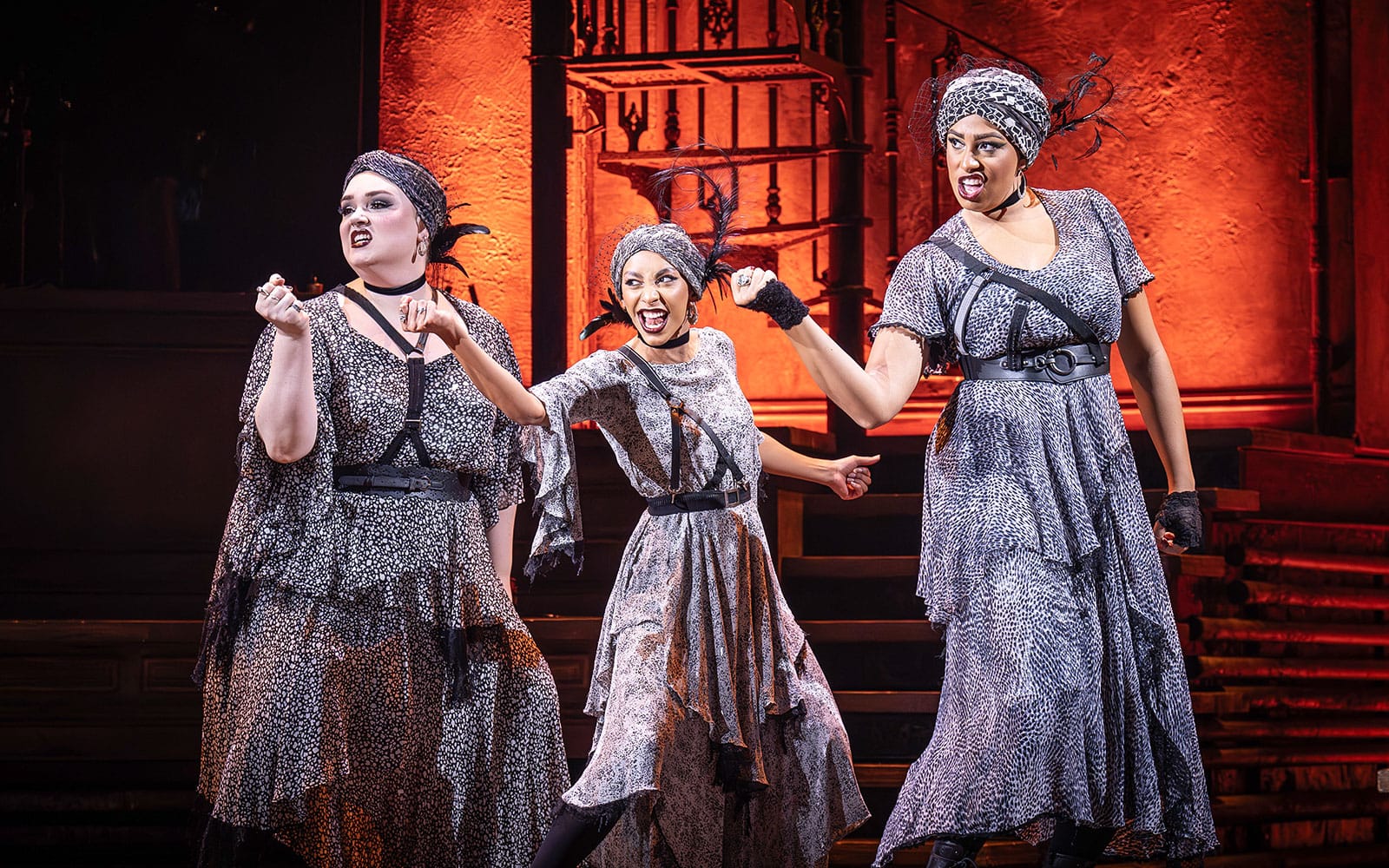
Hades and the Logic of Extraction
When the moment comes for Hades to step into his full authority, it arrives not with thunder or fire but with politics.
Why We Build the Wall begins almost conversationally, a call-and-response between the god and his workers. “Why do we build the wall, my children?” he asks, and the answers come back, one by one, like catechism. “We build the wall to keep us free.” What starts as explanation gathers into chant, then into anthem, until the theatre itself feels hemmed in by the sound.
Because we have and they have not
Because they want what we have got
The enemy is poverty
And the wall keeps out the enemy
And we build the wall to keep us free
That’s why we build the wall
We build the wall to keep us free
By the time the song ends, the cruelty no longer feels like cruelty at all. It has been justified so thoroughly, sung back so many times, that it feels inevitable.
Hades here embodies the logic of extraction itself: the world reduced to resources, people bent to the rhythm of machines, boundaries hardened in the name of efficiency and control. It is the same logic that devours forests, melts glaciers, and tells us that planetary destruction is simply the price of order and freedom. His reasoning is watertight, and yet it hollows out the possibility of life itself.
Hades here embodies the logic of extraction itself: his reasoning is watertight, and yet it hollows out the possibility of life itself.

Naive Dreams and Tragic Humanism
And yet, against Hades’s iron order, Orpheus sings another tune. He dreams of a world restored to harmony through Persephone’s return, a world where generosity and balance dissolve the need for walls:
Persephone
Who has finally returned to us with wine enough to share
Asking nothing in return except that we should live
And learn to live as brothers in this life
And to trust she will provide
And if no one takes too much
There will always be enough…
It is an intoxicating vision. A world where the cups are always full, where the earth provides, where trust is enough to bind us together.
This is what Terry Eagleton calls the liberal humanist vision: a belief in the dignity and freedom of the individual, in our capacity for self-realisation, in the idea that human beings naturally tend toward flourishing if only oppressive structures can be lifted away. It is an attractive dream: that once unshackled, we will live together in abundance, guided by reason and goodwill.
But Hadestown refuses to let that vision stand untested. For Mitchell, as for Eagleton, flourishing that ignores cruelty, scarcity, and betrayal is a hollow dream rather than a credible hope. The tragic frame insists that love, freedom, and spring are only credible when set against the forces that starve them. To imagine human flourishing without reckoning with darkness is not just naive—it is to miss the very conditions that make flourishing meaningful at all.
Tragic humanism rejects sentimentality; it knows that the world is not naturally inclined toward goodness, that cruelty is not an aberration but part of the human condition. It tells us there are no guarantees of redemption, but that the attempt is worth making anyway.
Orpheus’s song for a mended world is therefore not dismissed, but it is shown to be fragile, always shadowed by doubt, always tested against the iron logic of Hades.
And that, for Eagleton, is the difference between naive humanism and tragic humanism. One imagines that all will be well; the other insists that meaning is possible only after we have reckoned with what is not.
It is in this clash that the deeper meaning of Mitchell's Hadestown emerges. That is why the “tragic” matters. Without it, humanism drifts into sentimentality, as though progress and goodness were inevitable. With it, we are forced to reckon with the abyss—ecological, political, human—and still to choose to sing.
The tragic frame insists that love, freedom, and spring are only credible when set against the forces that starve them.

The Backward Glance
And this is where the backward glance matters most. After Eurydice descends into Hadestown, it is Orpheus’s song that changes everything. He follows her down (“Wait for me, I’m coming too”), crossing the threshold into the underworld armed with nothing but his lyre and his voice. There he confronts Hades with a tune so beautiful it makes even the god of iron remember what he has forgotten: his love for Persephone, the joy and abundance they once shared before everything hardened into walls and machinery.
For a moment, the music softens him. The song breaks through, and Hades relents. Eurydice may return—on two conditions. She must follow behind Orpheus on the long road to the surface, and he must not look back until they both have crossed into the upper world.
These are cruel conditions, of course. Hades cannot resist turning mercy into a test, generosity into control. The tragedy hinges on this bargain: Orpheus leads the way, Eurydice follows, and all he must do is trust.
In every telling, Orpheus almost makes it. Almost. He has the song, the vision, the courage to walk through the darkness—and yet, at the very threshold, doubt comes in.
Mitchell even gives the moment a song of its own, Doubt Comes In, staged with the revolving wheel that circles Orpheus forward as voices whisper around him—maybe she isn’t there, maybe the bargain was a trick, maybe he has been walking alone all along.
At the last moment, he falters. Not because he is weak, but because love and doubt are inseparable. To care deeply is to long for reassurance, to risk one last look.
That is what makes the backward glance so devastating. The vision of abundance is fragile, always shadowed by fear, and in that moment tenderness itself becomes the condition of failure. The myth turns on the glance, and the song falters. Eurydice is gone.
Camus wrote that we must imagine Sisyphus happy. Perhaps here we must imagine Orpheus turning—turning because he loves too much, because he cannot not turn.
To imagine Orpheus turning is to see that doubt is not a betrayal of love but its shadow. His failure is recognisably human. And it is precisely in that fragile, doomed turning that the song still matters—because it will be sung again. As if it might turn out differently this time.
Doubt is not a betrayal of love but its shadow. To care deeply is to long for reassurance, to risk one last look.
Other Companions in Tragic Thought
Tragedy has always drawn company. Out of the chorus of voices who have wrestled with what it means to face the worst and still live on, a few of my favourites stand out—Terry Eagleton, Peter Høeg, Hannah Arendt. Each, in their own register, helps us hear what Mitchell’s musical is saying about evil, failure, and the stubborn insistence of new beginnings.
Peter Høeg’s The Quiet Girl is one of those strange, slippery novels that resists being pinned down. On its surface it’s about Kasper Krone, a circus clown with hyperacute hearing, entangled in debts, conspiracies, and missing children. But really it’s a metaphysical fable. Kasper can hear people’s personalities as music—their inner timbre, the sympathetic vibration of their humanity.
For Høeg, music is ontology. To exist is to vibrate. To flourish is to resonate sympathetically with others. Kasper’s gift is only an amplification of what we all intuit: that we “hear” people’s humanity in their voices, gestures, silences.
Evil, then, can be understood as a kind of failure of music.
“There are no evil personalities,” Høeg writes. Everyone has a sympathetic sound. Evil appears where resonance drops out: the holes, the distortions, the places where people pour themselves into causes that strip them of their humanity. Possession, ideology, collective fury—these are forms of anti-music, what Høeg calls “the noise of war.”
The quiet girl at the novel’s centre embodies the opposite. She is quiet as concentrated presence, pure resonance, a figure around whom the possibility of new beginnings gathers. In her quietness we glimpse what Arendt calls natality: the capacity for new beginnings that is intrinsic in every birth, every act of freedom. Natality insists that even in the most totalising systems we will find the stubborn human capacity to start again, and in the shadow of despair, the possibility of something new remains.
Each time the story of Orpheus and Eurydice is told again, each time the song is sung despite its doomed ending, it enacts this natal power.
Evil can be understood as a kind of failure of music.

Curiosity, Care and the Work of Song
Seen this way, Hadestown takes its place in this wider conversation. Hades’s kingdom is the noise of war: chants, machinery, the iron hum of inevitability. Orpheus’s gift is resonance. His song makes the world vibrate again, restores love to Hades, reminds the workers of another frequency. He does not conquer with force or argument. He simply sings.
And though he fails, his failure is not total. Eurydice is lost, but the song remains. The chorus carries it. The audience carries it. The resonance survives.
This is why Orpheus is more than a character—he is a pedagogue in the ancient sense, the one who weaves meanings together in song, who sings society into coherence. And Hadestown itself is not just a story but a rhapsodic act.
Anaïs Mitchell re-sings an old myth into the timbre of our time—about borders, climate collapse, labour, and doubt—and implicates us in its retelling. We leave the theatre humming because the song has re-tuned us.
As Nathan Dufour Oglesby has pointed out, this is the ancient role of the rhapsode: to weave songs that make meaning, to bind together the fragments of a community’s experience into something coherent enough to live by. Texts like this are enactments of pedagogy, teaching us how to carry stories, how to listen, how to sing them again. This is what Oglesby calls rhapsodic pedagogy: teaching not by argument but by resonance, by re-sounding the world together.
And this, for me, is where curiosity and care return. More than mere traits or virtues, they are forms of resonance—ways of listening for the music in others, and responding in kind.
To walk a grokkist path is to keep listening for resonance even where the world has gone tone-deaf, to offer curiosity as the thread that binds, and care as the rhythm that restores. It is to sing possibility even when endings repeat, to mend the world in spite of the way that it is, and to raise our cups to the world that can be, even as we live in this one.
Curiosity and care are ways of listening for the music in others, and responding in kind.

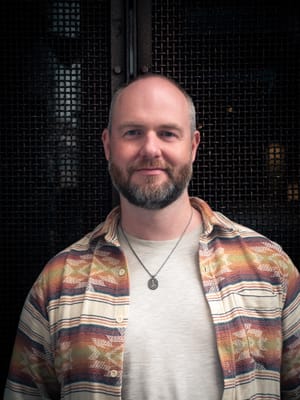
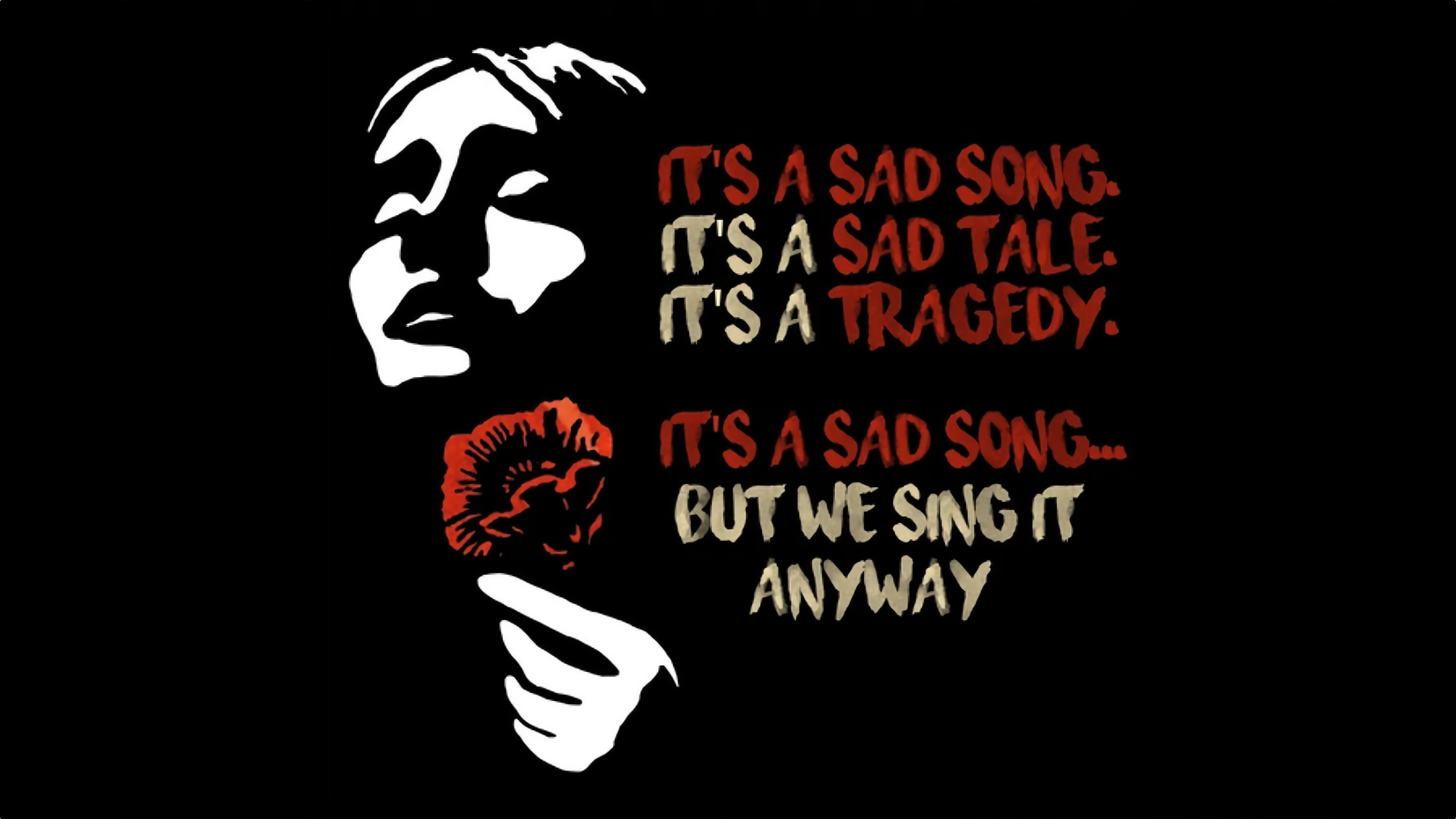
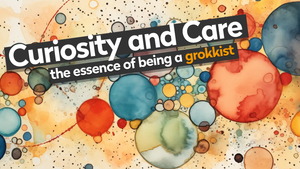






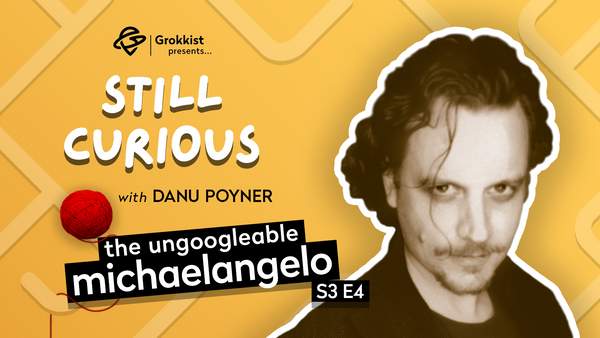
Member discussion